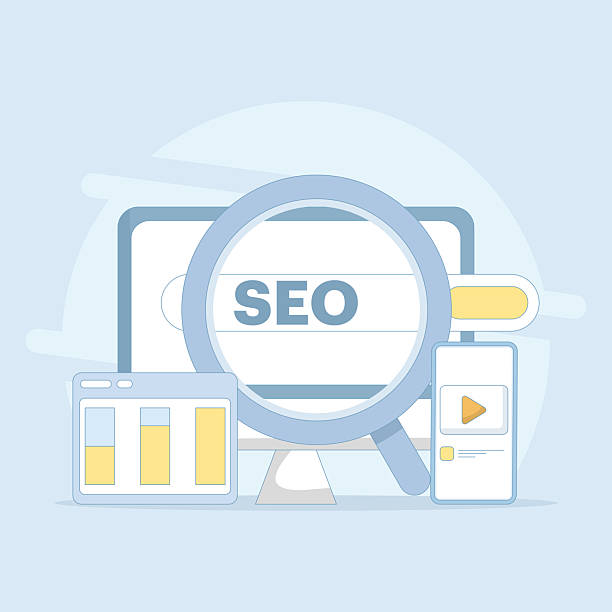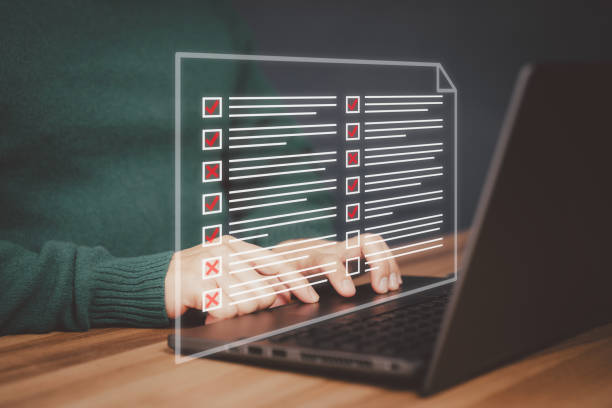Introduction to the Importance of Off-Page SEO in the Digital Age

In today’s competitive internet world, merely producing quality content is not enough to reach the peaks of ranking in search results.
One of the most important pillars of search engine optimization, often overlooked, is Off-Page SEO or off-page SEO.
This aspect of SEO refers to all activities performed outside your website to increase its credibility and authority in the eyes of search engines.
In fact, Off-Page SEO sends signals to search engines like Google, indicating your website’s reputation and value on the internet.
Without a strong Off-Page SEO strategy, even the best content might disappear amidst a deluge of information.
This chapter provides a comprehensive overview of why Off-Page SEO is crucial and its pivotal role in online success.
Learning the principles of Off-Page SEO is vital for any business looking to grow and gain visibility.
This comprehensive guide helps you familiarize yourself with various aspects of off-site optimization and implement successful strategies.
Why is Off-Page SEO so powerful? Because it signifies a vote of confidence from others for your site, which search engines interpret as a sign of credibility and value.
Do you have an online store but your sales aren’t as expected? RasaWeb solves your problem forever with professional e-commerce website design!
✅ Significant increase in conversion rate and sales
✅ Unparalleled user experience for your customers
⚡ Click here for free consultation with RasaWeb!
Key Components of Off-Page SEO: A Specialized Look

Off-Page SEO is not just about link building; it encompasses a range of activities and signals that all contribute to enhancing your website’s authority and position.
From a specialized perspective, the most crucial component of Off-Page SEO is backlinks or inbound links.
Backlinks are links from other websites to your website, considered a vote of confidence from that website for your content.
However, the quality of backlinks is far more important than their quantity.
A backlink from a reputable and relevant website is worth significantly more than dozens of low-authority and irrelevant site backlinks.
In addition to backlinks, other factors such as Brand Mentions, Social Signals, and participation in specialized forums and communities also play a role in Off-Page SEO.
Brand mentions, even without direct links, can signal to search engines that your website is a recognized authority in its field.
Although social networks do not directly influence Google’s ranking, they can help increase content visibility, attract traffic, and ultimately lead to natural backlink acquisition.
Understanding these components and how they interact is essential for a successful Off-Page SEO strategy.
This section thoroughly examines each of these components and how to optimize them, providing specialized guidance for implementing each.
Effective Link Building Strategies in Off-Page SEO

Link building is the beating heart of Off-Page SEO, and there are various strategies for acquiring high-quality backlinks.
One of the most popular and effective methods is Guest Blogging.
In this method, you write valuable content for other websites in your related field and, in return, receive one or more backlinks to your website.
Another method is Broken Link Building.
In this method, you find websites with broken links to old resources, then suggest your content as a better replacement.
Creating Resource Pages is also an excellent strategy; you create a list of useful resources in your field and ask other websites to link to it.
Using infographics and engaging visual content that are highly shareable can naturally attract many links.
Furthermore, collaborating with influencers and authoritative figures in your industry not only helps increase brand awareness but can also lead to acquiring powerful backlinks.
Finally, it’s important to note that you should never resort to illicit and spammy link-building methods (such as buying backlinks in large quantities), as this will not only fail to help your ranking but can also lead to severe penalties from search engines.
This section provides a comprehensive guide to choosing and implementing the best link-building strategies.
| Strategy | Description | Main Advantage |
|---|---|---|
| Guest Blogging | Writing articles for other sites and getting backlinks | Acquiring natural links and increasing authority |
| Broken Link Building | Finding broken links on other sites and offering your content | Creating opportunities for relevant backlink acquisition |
| Infographics and Visual Content | Producing engaging and shareable visual content | Naturally attracting links and widespread sharing |
| Resource Page Building | Creating comprehensive lists of useful resources | Becoming an authority in your field and attracting links |
Quality or Quantity in Backlinks: Which is More Important?
![]()
This is a contentious question and one of the main topics in the field of Off-Page SEO that has always been discussed among experts.
Not long ago, many SEOs sought to acquire as many backlinks as possible, without regard for their quality or relevance to their website’s topic.
However, with the advancement of Google’s algorithms, especially algorithms like Penguin, the emphasis on backlink quality has significantly increased.
Today, a backlink from a High Authority website, relevant to your field of activity and with real traffic, can be worth far more than hundreds of low-quality backlinks from spammy or irrelevant sites.
Low-quality links not only do not help your ranking but may also lead to your website being penalized by Google.
Google seeks to rank websites at the top of search results that are truly trustworthy and useful to users, and high-quality backlinks are a sign of this trust and authority.
Therefore, your Off-Page SEO strategy should focus on acquiring natural and organic links from reputable and relevant websites.
This approach not only brings more stability to your ranking but also minimizes the risk of penalties.
Focusing on quality is a long-term strategic decision for success in off-site optimization.
Are you frustrated with your online store’s low conversion rate?
RasaWeb, with professional e-commerce website design, is your definitive solution!
✅ Increase your sales and revenue
✅ Unparalleled user experience for your customers
⚡ Get a free consultation right now!
How is Competitor Analysis Performed in Off-Page SEO?

One of the most crucial steps in developing a successful Off-Page SEO strategy is precise competitor analysis.
This process helps you identify the strengths and weaknesses of your competitors’ off-site optimization strategy and learn from them.
To start, create a list of your 10 to 15 main competitors in search results.
Then, use specialized SEO tools like Ahrefs, Semrush, or Moz to examine each of their backlink profiles.
Look for how many backlinks they have, which domains they’ve linked from, the quality of these domains (based on metrics like Domain Authority or Domain Rating), and what Anchor Texts they’ve used.
Identifying websites that have linked to your competitors but not yet to you can be a golden opportunity to acquire new backlinks.
Also, look for your competitors’ link-building patterns.
Do they frequently use guest blogging? Do they collaborate with influencers? Have they created specific content that has attracted many links? Analyzing this information not only helps you emulate effective competitor strategies but also reveals gaps you can target to surpass your competitors.
This is an analytical and continuous process that requires precision and the use of the right tools.
With this analysis, you can develop a smart plan for your Off-Page SEO.
The Role of Brand Mentions and Online Reputation Management

Alongside backlinks, brand mentions are another important signal in Off-Page SEO that is often overlooked.
Although these mentions may not include direct links to your website, Google and other search engines can readily identify these references and consider them as a sign of your brand’s reputation and authority.
When your brand name, products, or services are mentioned across various websites, news articles, forums, and social networks, it signals to search engines that your brand is recognized and discussed within its industry.
Online Reputation Management is also closely related to this topic.
Monitoring what is said about your brand online and responding appropriately to comments and feedback can help strengthen brand image and increase trust.
This involves tracking comments on websites, forums, social networks, and review sites.
A positive online reputation not only attracts new customers but also indirectly influences your Off-Page SEO.
Websites seeking credible sources are more likely to link to a brand with a good reputation.
Therefore, part of your Off-Page SEO strategy should include building and maintaining a strong online reputation, which in turn leads to increased brand signals and ultimately improved ranking.
Social Signals and Their Impact on Off-Page SEO

In the past, it was believed that the number of likes, shares, and comments on social networks (Social Signals) had a direct impact on website ranking in Google.
Although Google has repeatedly stated that social signals are not directly considered as a ranking factor in its algorithms, their role in Off-Page SEO cannot be ignored.
Social signals indirectly impact off-site optimization through several paths.
Firstly, increased visibility of your content on social media can lead to increased website traffic.
More traffic, in turn, creates more opportunities for acquiring natural and high-quality backlinks.
Secondly, content that goes viral on social media is more likely to be seen and linked to by webmasters and bloggers.
Thirdly, strong activity on social media helps strengthen brand awareness and online reputation, which, as previously mentioned, is itself an important signal for search engines.
Therefore, although social signals alone are not sufficient, they are an integral part of a comprehensive Off-Page SEO strategy.
A successful social media strategy helps you reach a wider audience with your content and thereby increase your link-building and branding opportunities.
| Social Platform | Method of Impact | Example of SEO-Related Activity |
|---|---|---|
| Twitter (X) | Increased speed of news and content dissemination, attracting influencers’ attention | Quick sharing of news articles, answering questions |
| Strengthening professional credibility, networking for B2B backlinks | Publishing specialized articles, connecting with website administrators | |
| Facebook / Instagram | Increased brand awareness, referral traffic, customer engagement | Promotional and informational posts, interacting with followers |
| YouTube | Attracting video traffic, becoming an authority in visual content | Producing video tutorials, linking to the site in descriptions |
Measuring Success and Avoiding Common Mistakes in Off-Page SEO

To ensure the effectiveness of your Off-Page SEO strategy, continuous measurement and analysis of results are essential.
Key Performance Indicators (KPIs) in Off-Page SEO include: the number and quality of new backlinks, increased Domain Authority/Rating, improved ranking of target keywords in search results, and increased organic website traffic.
Using SEO analytical tools helps you monitor these indicators and adjust your strategy as needed.
However, alongside measurement, understanding and avoiding common mistakes are equally important.
One of the biggest mistakes is buying low-quality backlinks or using Private Blog Networks (PBNs).
These tactics might be tempting in the short term, but they significantly increase the risk of being penalized by Google and can cause irreparable damage to your online reputation.
Another mistake is neglecting backlink profile diversity; focusing solely on one type of link building (e.g., only guest blogging) can appear unnatural.
Also, failing to monitor Lost Backlinks and Toxic Backlinks is a common mistake.
Continuous monitoring and cleaning up harmful links (using Google’s Disavow tool) are essential for maintaining the health of your backlink profile.
By following these guidelines and precise analysis, you can maximize the effectiveness of your Off-Page SEO and prevent potential challenges.
Are your online store visitors leaving before making a purchase? Don’t worry anymore! With RasaWeb’s professional e-commerce website design services, solve the problem of converting visitors into customers forever!
✅ Significant increase in conversion rate and sales
✅ Unparalleled and engaging user experience
⚡ Contact us now for a free consultation!
Future Trends and Ethical Considerations in Off-Page SEO

The world of SEO is constantly evolving, and Off-Page SEO is no exception.
Staying informed about future trends can help you keep your strategy updated to maintain competitiveness.
One of the most important emerging trends is Google’s increasing emphasis on the E-E-A-T concept (Experience, Expertise, Authoritativeness, Trustworthiness).
This means that search engines are increasingly looking for websites whose content is created by knowledgeable and authoritative individuals and conveys a sense of trust to the user.
This trend indirectly impacts Off-Page SEO, as backlinks and brand mentions from credible and relevant sources with high E-E-A-T gain more value.
Furthermore, the use of Artificial Intelligence in SEO (AI in SEO) is also increasing; not only in SEO analysis tools but also in content creation and identifying link-building patterns.
Alongside these trends, ethical considerations in Off-Page SEO are of paramount importance.
You should always strive to acquire natural and high-quality links and avoid any Black Hat SEO tactics that could harm your reputation and ranking.
This includes avoiding paid links, unnatural link exchanges, and the use of link farms.
Adhering to ethical principles not only prevents penalties from Google but also helps establish a stable and reputable online presence for your business.
This forward-looking perspective and adherence to ethical principles guarantee long-term success in off-site optimization.
Conclusion and Continuous Off-Page SEO Optimization

In this comprehensive article, we thoroughly explored various aspects of Off-Page SEO.
From its fundamental importance in website ranking to key components like link building, brand mentions, and the role of social signals.
We saw how quality trumps quantity in backlinks and what role competitor analysis plays in formulating effective strategies.
Furthermore, we discussed the importance of measuring success and avoiding common pitfalls, as well as a look at future trends and ethical considerations in this domain.
Finally, it’s important to remember that Off-Page SEO is not a one-time process; rather, it requires continuous optimization and ongoing monitoring.
Google’s algorithms are constantly changing, and SEO strategies must adapt accordingly.
This means monitoring backlink profiles, updating content to attract new links, and staying active on relevant platforms.
Investing in Off-Page SEO is an investment in the future of your online business.
By correctly implementing the strategies introduced, you can not only significantly improve your website’s ranking but also strengthen your brand’s credibility and authority in the digital space.
This guide hopes to have provided you with the necessary tools and knowledge to master Off-Page SEO and achieve sustainable success in search results.
Frequently Asked Questions
| Row | Question | Answer |
|---|---|---|
| 1 | What is Off-Page SEO? | Off-page SEO refers to a set of actions performed outside your website to improve its ranking in search engines. These actions include backlink building, social media presence, branding, and so on. |
| 2 | Why is Off-Page SEO highly important? | Off-Page SEO signals to search engines that your website is credible, popular, and trustworthy. High-quality backlinks from reputable sites are strong signals for better ranking and help increase your domain authority. |
| 3 | What are the most important components of Off-Page SEO? | The most important components of Off-Page SEO include: Link Building, Content Marketing, Social Media Marketing, Influencer Marketing, and Online Reputation Management. |
| 4 | What is a backlink and why is it important for Off-Page SEO? | A backlink is a link that points from another website to your website. These links act as a “vote of confidence” from Google’s perspective and indicate the credibility of your content. The higher the number and quality of backlinks, the better your site’s ranking will be. |
| 5 | What are the types of backlinks in terms of their SEO impact? | The two main types of backlinks are DoFollow and NoFollow. DoFollow backlinks pass authority (Link Juice) and directly impact ranking. NoFollows do not pass authority but can still generate traffic and help make the link profile appear natural. (Also UGC and Sponsored) |
| 6 | How can high-quality backlinks be created for your site? | To build high-quality backlinks, methods such as: producing excellent and shareable content, guest posting on relevant and reputable sites, Broken Link Building, Digital PR, and analyzing competitor backlinks can be used. |
| 7 | What are Toxic Backlinks and how do they affect a site? | Toxic or spam backlinks are links that point to your site from low-quality, spammy, or irrelevant websites. These backlinks can harm your site’s ranking and even lead to penalties by Google’s algorithms. |
| 8 | What is the role of social networks in Off-Page SEO? | Although social signals (likes, shares, etc.) are not direct ranking factors, they do help Off-Page SEO. They increase content visibility, drive direct traffic to the site, and ultimately boost the chances of acquiring natural backlinks and improving brand recognition. |
| 9 | What is the importance of diversity in a backlink profile? | Diversity in a backlink profile means that your links come from various sources (blogs, forums, news sites, directories), with diverse anchor texts, and include a mix of DoFollow and NoFollow links. This diversity signals to Google that your link building is natural and organic. |
| 10 | What are common mistakes in Off-Page SEO that should be avoided? | Common mistakes include: buying backlinks in large quantities and from low-quality sources, over-optimization with target keywords, neglecting quality over quantity in backlink building, lack of diversity in the link profile, and ignoring toxic backlinks and failing to disavow them. |
And other services by RasaWeb Advertising Agency in the field of advertising
Smart Data Analysis: A creative platform for improving online growth with attractive UI design.
Smart Marketing Automation: A professional solution for increasing website traffic with a focus on user experience customization.
Smart Social Media: A professional solution for analyzing customer behavior with a focus on intelligent data analysis.
Smart Custom Software: A combination of creativity and technology for campaign management through attractive UI design.
Smart Content Strategy: A combination of creativity and technology for campaign management using real data.
And over hundreds of other services in the field of internet advertising, advertising consultation, and organizational solutions
Internet Advertising | Advertising Strategy | Advertorial
Sources
? Ready to transform your business in the digital world? RasaWeb Afarin Digital Marketing Agency, specializing in various fields including professional website design, SEO, and social media management, paves your path to growth and success.
📍 Tehran, Mirdamad Street, next to Bank Markazi, Southern Kazeroon Alley, Ramin Alley, No. 6


